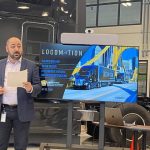Pittsburgh-based Locomation, a company developing self-driving trucks, touted its technology Monday when they invited state leaders to tour its Lawrenceville facility.
Department of Community and Economic Development Acting Secretary Neil Weaver and Deputy Secretary of Technology and Innovation Steve D’Ettorre visited the site, which has been supported by Gov. Tom Wolf’s administration through DCED’s Ben Franklin Technology Development Authority.
Financial assistance through the Ben Franklin technology program “enabled us to grow our team and source the pieces of equipment and technology” necessary to further develop their autonomous truck technology, said Çetin Meriςli, CEO and co-founder of Locomation.
The Ben Franklin Technology Development Authority has invested nearly $2 million in technology companies throughout the commonwealth during the Wolf administration, Weaver said. A Locomation representative declined to provide information regarding how much the company received through the initiative.
“We strive to be visionaries, but we are interested in visions we can actually fulfill,” Meriςli said, explaining that entirely self-driving vehicles are likely “years and years off.”
Instead, their autonomous trucks operate on a unique follow-the-leader model. The idea is that two trucks would work together in a small convoy, Meriςli explained. A human driver would operate the lead vehicle, while a second, driverless truck follows close behind it.
“Our autonomous follower constantly follows where the lead truck is and where the lead truck was,” Meriςli said, adding that the system should allow the vehicles to navigate obstacles like work zones or accidents.
Legislation currently being considered in the state legislature would allow them to operate in this manner, though current laws prohibit entirely driver-less drivers. Finch Fulton, the company’s vice president of strategy and policy, said they are hopeful that the legislation could be passed this summer, and said they have been advocating for such a measure.
The autonomous technology Locomation is developing aims to improve capacity and efficiency in the trucking industry, while also addressing the driver shortage and improving quality of life for drivers, Meriςli said.
Convoys could travel 1,000 miles per day, with 22 hours of driving time, he said. The goal is to have two drivers with each convoy — one operating the lead vehicle and the second resting or sleeping in the second truck. That would allow them to switch positions after 11 hours, doubling the amount of travel time in a day, as truck drivers are permitted to drive no more than 11 hours per day.
“We are looking at doubling the capacity of existing assets,” Meriςli said, explaining that increased efficiency would also curb the climate impacts of more inefficient truck trips.
He suggested their model could cut greenhouse emissions by 22%, lower fuel consumption by 21% and limit operating costs by 19%.
The company, which is approaching its fourth anniversary, recently expanded from about 30 employees to 130 employees, including about 100 working at the Pittsburgh headquarters, Meriςli said.
The company now has 12 trucks in their test fleet — up from four a year ago. They plan to add a dozen more in the next year, Meriςli said.
The company has contracts in place with Wilson Logistics, PGT Trucking and Christenson Transportation. Meriςli said they are aiming to deliver the first trucks to Wilson by 2023.
Currently, they are in the testing phase.
Weaver, the DCED acting secretary, said supporting autonomous truck technology can bolster the trucking industry.
“Trucks deliver the vast majority of our goods, and with the rise of e-commerce, demand is only going to go up in the years ahead,” he said. “Automation is a way to increase production and employment.”
He called for embracing automation “in industries that need it most, like freight.”
Locomation, he said, is a “microcosm of the Pittsburgh story” and one of many companies that have shown how the city can pivot into the technology sector after its history as a steel town.











